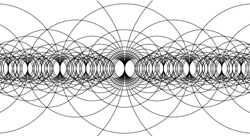"6 Integers" Is a Mathematica-Generated Musical Composition
On January 25, 2000, concertgoers at the University of Cincinnati (UC) College Conservatory of Music heard the world premiere of "6 Integers," a Mathematica-generated musical composition by Carl McTague, a freshman at UC. Computed with Mathematica and rendered using a synthesizer playing piano and marimbas, "6 Integers" premiered to warm applause and positive responses. Some listeners called it simply "awesome," while other composers recognized it as "postminimalism" and "a fascinating new direction" in algorithmic composition. The former description is particularly apt given that much of McTague's musical inspiration is derived from the works of 1960s minimalist composers such as Philip Glass and Steve Reich.
The piece "6 Integers," as created by McTague, is an expression in Mathematica (just as x2 + 1 + (p(x)) is an expression). It aspires to the ideal, espoused by the architect Howard Roark in The Fountainhead by Ayn Rand: "Nothing can be reasonable or beautiful unless it's made by one central idea, and the idea sets every detail." According to McTague, "every detail" (except the timbre of the piano and marimbas) of "6 Integers" is determined by a simple, "central" formula; neither chance nor human intervention play any role in the work. The entire piece, including its double binary structure, arises, essentially, from modulo division and the integers 1 through 6. Over the course of the composition, a single, coherent process explores these six integers by means of 5,292 notes and four independent channels of audio. It is the first full piece generated by the Hierarchical Functional Inheritance Model (HFIM).
The Hierarchical Functional Inheritance Model is the basis of the "very promising mathematically-driven approach to composition" that Carl McTague has been working on for several years now, says Mara Helmuth, director of the UC Center for Computer Music studio. After composing by hand for some years, McTague embarked on an exploration of a new system of musical composition--a system based on the interactions of simple mathematical patterns. He produced tables and seemingly endless strings of numbers and permutations by hand. "Eventually, I realized that the digital computer could be of immense use in my work," he said. McTague, who has been using Mathematica for three years now, says he chose to do his musical work in Mathematica because "I think in mathematical terms and Mathematica lets me implement my ideas in mathematical terms." Although his initial progress was slow, over time McTague developed the HFIM, which is described in a paper on his web site, to help facilitate his work.
The HFIM provides an abstract computational model for creative work, enabling McTague to express musical structures in abstract mathematical terms. The omputer then expands these expressions into simple, explicit instructions for performance. Says Helmuth, "One of the wonderful things about algorithmic composition is that it can allow people to experience mathematical and scientific ideas in the realm of the arts and senses, increasing modes of understanding for the nonscientist." In the case of "6 Integers," Mathematica evaluated the composition's "expression" to generate a tremendous hierarchical structure, which it then symbolically "flattened" to produce a list of explicit instructions (each command representing a note). A Perl script then translated these instructions into a binary format understood by synthesizers.
On his web site, Carl McTague describes himself as an "aspiring composer, fiddler, hacker, mathematician, minimalist, and scientist." Heading into only his second year at UC, McTague has already compiled quite an impressive resume of accomplishments, including numerous local and national awards. He is a full-scholarship student, triple majoring in engineering mechanics, mathematics, and medicine, while continuing his music studies under the direction of Ms. Helmuth. Although he was accepted to medical school while still in high school, he is undecided about his future plans. His varied interests include the exploding medical research field, the world of technical computing, and mathematics--which "is a lot of fun, too."
When asked where his music fits into the picture, McTague responded, "I have no idea! I guess it has a lot to do with how good my ideas turn out being. I was frankly blown away by '6 Integers'--and it was such a simple application of my ideas." McTague has a lot more ideas that he's working on now. An alternate recording of "6 Integers" that he's just released employs bolder orchestration to better illuminate the piece's complexity. Also, he is currently working with custom audio software to manipulate sampled and generated sounds directly. In the future he would like to experiment with traditional musical scores--but this is terribly difficult as "it's so much easier to communicate with a synthesizer than a human!"
Although it remains to be seen just how far McTague will go with his algorithmic compositions, his options are obviously wide open. Says McTague, "The dawn of the information age is an exciting time for composers. Traditionally we have struggled for live performances of our pieces: they are expensive and short-lived, and their potential audiences are quite limited. But today I can create a piece with a digital computer, alone, and make it permanently available to a worldwide audience. It is terrifically liberating!"
"6 Integers" can be downloaded as a stereo MP3 file. To read more about Carl McTague and his music, beliefs, writings, and other accomplishments, visit his web site at http://www.mctague.org/carl.
Get started with Wolfram technologies, or work with us to apply computational expertise to your projects.
Questions? Comments? Get in touch: 1-800-WOLFRAM, or email us »









